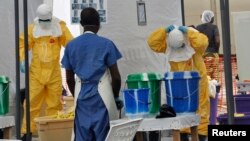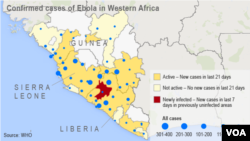South Africans working for Doctors Without Borders, known by its French initials MSF, are calling on their fellow citizens to support efforts to stem the Ebola outbreak in West Africa. More than 4,000 people have died and the number of new infections is doubling every three weeks. Yet there is a severe shortage of medical facilities, contact tracing, surveillance and education on Ebola in affected communities.
The message from MSF is a simple one: the international community is failing the people of West Africa.
MSF says that despite promises from various countries to help stem the deadly virus, to date, few pledges have translated into concrete action on the ground. Sharon Ekambaram, head of a MSF South Africa unit, says there are critical gaps in all aspects of the response.
“And so the spread of Ebola continues unabated as the response fails to curtail and bring down new infections," she explained. "MSF is really angry that the world and the international community is failing the people of Sierra Leone, Guinea and Liberia. It is hard to understand, to be frank, the media frenzy about individual contaminations of people in the USA and in Europe… rich nations have the resources to contain spread of Ebola if it reaches their shores. It is the people of the impoverished communities of West Africa that are at the highest risk of infection and death.”
Launching a new campaign called “Tough Decisions” in Johannesburg Tuesday, MSF staff working at Ebola centers in the three affected countries candidly appealed to South Africans for financial and skill support.
Jens Pedersen, humanitarian affairs adviser, said that the people, organizations and states that have promised support should be held to account.
“Because MSF is one of the main respondents to this Ebola outbreak and because there has been no real response on the ground as of yet, of course, we are burning our candles [at] both ends…we are carrying an immense burden which forces us to stretch ourselves very, very thin," he noted.
Dr. Juli Switala, an MSF pediatrician who was working in Sierra Leone before the outbreak, explained how a lack of resources is forcing them to turn away people showing symptoms of the virus from treatment centers - only to be sent back to their families to die and infect others. The affected countries, she says, were already fighting against malaria, severe malnutrition, and HIV/Aids with inadequate medical facilities. The health system in Sierra Leone is “collapsing” she said.
“Ebola is forcing us to make some very tough decisions… Not every death that is from Ebola is actually caused by Ebola," Switala said. "[M]ore people are dying from malaria because of Ebola, more women are dying in childbirth because of Ebola…until we sort out Ebola, we cannot get back to sorting out the stuff we need to.”
The cost to deal with the virus is monumental with MSF estimating that each clinic visit costs around $20. With little or no pharmaceutical industry in a country like Sierra Leone, medical supplies and protective suits have to be imported. Medical staff can only work for an hour or so at a time under layers of protective gear in the sweltering tropical heat. Most of the protective gear has to be incinerated.
Those who die of Ebola are washed in chlorine, wrapped in two body bags and disinfected again before being buried. MSF says factories have been opened in Asia to begin to satisfy the demand of protective suits.
But MSF says they are still waiting for all the world to swing into action.





